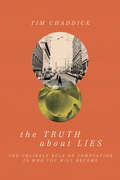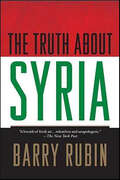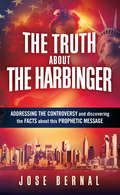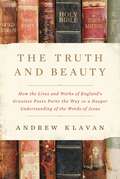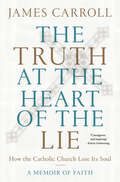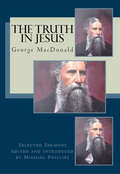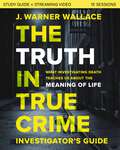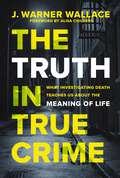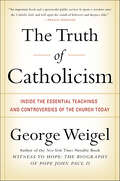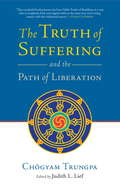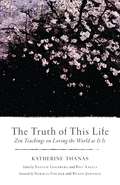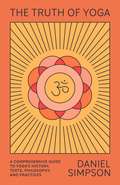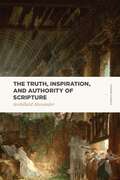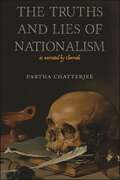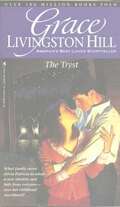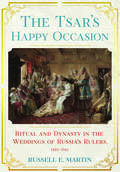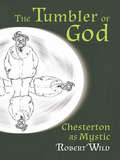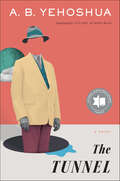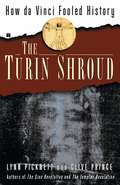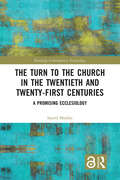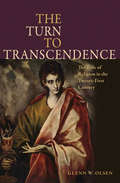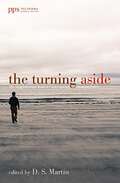- Table View
- List View
The Truth about Lies
by Tim ChaddickTemptation isn't merely about winning or losing a battle. It's about discovering who you truly are. And what matters most. On a daily basis, we are all tempted to enjoy the gifts of this world while making the Giver optional or irrelevant in our quest for life. But what if, in God's purposes, temptation is not merely an obstacle to overcome but an opportunity to flourish in faith? Living in the truth exposes lies and turns moments of temptation into character-shaping opportunities, powerfully displaying our true identity as followers of Jesus.
The Truth about Santa Claus
by James Cross GiblinExplains how historical facts, religious mythology, folklore, tradition, and commercial promotion have combined to give us the modern figure of Santa Claus.
The Truth about Syria
by Barry RubinSyria has long presented a serious problem for the Middle East region and U.S. policy. With its mix of competing religious and ethnic groups, radical ideologies, and political repression, it is a 72,000-square-mile time bomb waiting to go off. Yet surprisingly, very little is known about this country and the role it has played in shaping the destiny of the Middle East. In The Truth about Syria, Middle East expert Barry Rubin looks at the critical issues that have made the country the powderkeg of the Middle East and offers an insightful analysis of the effects of recent developments.
The Truth about The Harbinger: Addressing the Controversy and Discovering the Facts About This Prophetic Message
by Jose BernalAnswers to the questions that people are asking about The Harbinger From its initial release, The Harbinger by Jonathan Cahn has become a national phenomenon, hailed by readers, pastors, and American leaders alike and described as “amazing,” “stunning,” and “mind-blowing.” The Harbinger reveals an ancient biblical mystery and the danger of judgment America faces as it departs ever further from God. But with such popularity comes inevitable questions and discussion. In The Truth About “The Harbinger,” Jose Bernal investigates the facts behind this New York Times best-selling book to reveal: · The biblical foundation and truth behind The Harbinger’s message · Common misperceptions about what The Harbinger is and is not saying · How some critics have sought to redefine its narrative · How the prophetic patterns described are actually coming to pass With a strong biblical foundation, in-depth analysis of each point and issue, and a look at the book’s phenomenon and impact, including the lives changed by its message, The Truth About “The Harbinger” will encourage you to pray for America and stand for the truth.
The Truth and Beauty: How the Lives and Works of England's Greatest Poets Point the Way to a Deeper Understanding of the Words of Jesus
by Andrew KlavanFollow Andrew Klavan to a deeper, richer understanding of the words of Jesus.Andrew Klavan believed what he read in the Gospels, but he often struggled to understand what Jesus really meant. So he began a journey of wrestling with the beautiful and often strange words of Jesus.He learned Greek in order to read the Gospels in their original languages, and he vowed to set aside any preconceptions about what the Scriptures say. But it wasn't until he began exploring how some of history's greatest writers wrestled with the same issues we confront today--political upheaval, rejection of social norms, growing disbelief in God--that he found a new way of understanding what Jesus meant.In The Truth and Beauty, Klavan combines a decades-long writing career with a lifetime of reading to discover a fresh understanding of the Gospels. By reading the words of Jesus through the life and work of writers such as William Wordsworth and John Keats, Mary Shelley and Samuel Taylor Coleridge--the English romantics--Klavan discovered a way to encounter Jesus in a deeper and more profound way than ever before.For readers seeking to find renewed meaning in the words of Jesus--and for those who are striving for belief in a materialistic world--The Truth and Beauty offers an intimate account of one man's struggle to understand the Gospels in all their strangeness, and so find his way to a life that is, as he says, "the most creative, the most joyful, and surely the most true."
The Truth at the Heart of the Lie: How the Catholic Church Lost Its Soul
by James Carroll&“Courageous and inspiring.&”—Karen Armstrong, author of The Case for God &“James Carroll takes us to the heart of one of the great crises of our times.&”—Stephen Greenblatt, author of The Swerve An eloquent memoir by a former priest and National Book Award–winning writer who traces the roots of the Catholic sexual abuse scandal back to the power structure of the Church itself, as he explores his own crisis of faith and journey to renewal James Carroll weaves together the story of his quest to understand his personal beliefs and his relationship to the Catholic Church with the history of the Church itself. From his first awakening of faith as a boy to his gradual disillusionment as a Catholic, Carroll offers a razor-sharp examination both of himself and of how the Church became an institution that places power and dominance over people through an all-male clergy. Carroll argues that a male-supremacist clericalism is both the root cause and the ongoing enabler of the sexual abuse crisis. The power structure of clericalism poses an existential threat to the Church and compromises the ability of even a progressive pope like Pope Francis to advance change in an institution accountable only to itself. Carroll traces this dilemma back to the Roman Empire and the Middle Ages, when Scripture, Jesus Christ, and His teachings were reinterpreted as the Church became an empire. In a deeply personal re-examination of self, Carroll grapples with his own feelings of being chosen, his experiences as a priest, and the moments of doubt that made him leave the priesthood and embark on a long personal journey toward renewal—including his tenure as an op-ed columnist at The Boston Globe writing about sexual abuse in the Church. Ultimately, Carroll calls on the Church and all reform-minded Catholics to revive the culture from within by embracing anti-clerical, anti-misogynist resistance and staying grounded in the spirit of love that is the essential truth at the heart of Christian belief and Christian life.
The Truth in Jesus: The Nature Of Truth And How We Come To Know It
by George MacDonaldThis collection of sermons and theological essays by the beloved Victorian author explore the nature of God&’s truth and how it is revealed to us. The Victorian author, poet, and theologian George MacDonald inspired some of the greatest writers of the early 20th century, including C.S. Lewis, who said MacDonald&’s books were pivotal in leading him toward Christianity. But while MacDonald&’s fiction remains popular—with such notable classics as Robert Falconer and At the Back of the North Wind—his theological nonfiction is often challenging for modern readers. Now MacDonald scholar and biographer Michael Phillips addresses this difficulty with this expertly edited edition of MacDonald&’s sermons and essays about God&’s truth. Each selection is accompanied by Phillips&’s illuminating commentary, providing readers with an essential road map into the expansive world of George MacDonald&’s theological writings.
The Truth in True Crime Investigator's Guide plus Streaming Video: What Investigating Death Teaches Us About the Meaning of Life?
by J. Warner WallaceAmerica's cold-case detective explores 15 surprising rules for life. Streaming video access included.This video study and study guide includes access to fifteen streaming video sessions (plus a bonus session), thoughtful introductions to each session that build from the book and videos, questions for personal reflection and application to embed these important principles into your life, and discussion questions that are perfect for leading a group or team through the material.In The Truth in True Crime Investigator's Guide, detective J. Warner Wallace explores the clues lying behind our human nature as he uncovers fifteen life truths gleaned from both contemporary murder investigations and ancient biblical wisdom.Every lesson introduces you to an investigation of a death as Wallace and his partner Rick chase down leads and along the way learn guiding principles to help us thrive and flourish as human beings created in the image of God. These fifteen attributes of human beings have been confirmed by modern sociological studies but were first described on the pages of Scripture. Even if you don't believe in God, these are valuable insights into our human condition, helping you better understand your own identity and the identity of your Creator.This study guide has everything you need for a full personal or group experience.The study guide itself--with thoughtful introductions, questions for personal reflection and application, and discussion questions for leading a group or team.An individual access code to stream all video sessions online. (You don't need to buy a DVD!)Sessions and video run times:1. A Pool of Blood (Under My Feet)2. Fake IDs and a Stolen Identity3. A Target, a Bull's-Eye, and a Circle of Concern4. Trajectory Decisions (for Better or Worse)5. Santa Claus and Misplaced Devotion6. Legends, Liars, and Liabilities7. Felons, Fugitives, and Financial Freedom8. Sense and Suffering9. Prejudice, Injustice, and the Father of All "Isms"10. Tough Love and a Tale of Two Brothers11. The Killer Inside12. A Good Guilt Trip13. What Gangsters Have in Common14. Death Sentences and Life without Parole15. Every Kind of Stupid(Bonus Session) The Bible Describes You the Way You Really AreStreaming video access code included.?Access code subject to expiration after 12/31/2029. Code may be redeemed only by the recipient of this package. Code may not be transferred or sold separately from this package. Internet connection required. Void where prohibited, taxed, or restricted by law. Additional offer details inside.
The Truth in True Crime: What Investigating Death Teaches Us About the Meaning of Life
by J. Warner WallaceExplore fifteen life-truths gleaned from both contemporary murder investigations and ancient biblical wisdom."Every murder investigation teaches two lessons: a death lesson and a life lesson."For decades, cold-case homicide detective J. Warner Wallace investigated the causes behind deaths and murders, chasing one lead after another as he attempted to solve the case. Several of these cases remain open, unsolved mysteries. . .But even those that haven't yet revealed the identity of the killer do expose the truths of human nature: what's important to us, what threatens our well-being, and what causes us to flourish.Join Wallace as he investigates life lessons he learned as a detective, so that you can:Better understand your own identity and the identity of your Creator.Rethink the nature of death so you can live a better life.Uncover life-truths gleaned from both contemporary murder investigations and ancient biblical wisdom.Discover profound attributes of human beings that will guide you down the path of true self-discovery. Each chapter introduces you to an investigation of a death as Wallace and his partner Rick chase down leads and along the way learn guiding principles to help you thrive and flourish as a human being created in the image of God.
The Truth of Catholicism: Inside the Essential Teachings and Controversies of the Church Today
by George Weigel“An important book and a spectacular public service. It opens a window onto the Catholic faith and will open the minds of believers and skeptics alike.” —Peggy NoonanThe Catholic Church may be the most controversial institution in the world. Some find its teachings inexplicable, puzzling, even cruel. In this incisive new work, George Weigel suggests that we look at Catholicism and its controversies from “inside” the convictions that make those controversies not only possible, but necessary. The truths of Catholicism then come into clearer focus as affirmations and celebrations of human life and human love, even as they challenge us to imagine a daring future for humanity and for ourselves.Is Jesus uniquely the savior of the world? Is the moral life about rules or about happiness? Doesn’t suffering contradict the biblical claim that God is good? How does the Catholic Church think about other Christians and about other great world religions? In an engaging, accessible style, George Weigel leads us into the truth of Catholicism: the truth about a love that creates a vast, liberating terrain on which to live a fully human life.
The Truth of Suffering and the Path of Liberation
by Chogyam Trungpa Judith L. LiefChögyam Trungpa’s in-depth exploration of the Four Noble Truths—the foundational Buddhist teaching about the origin of suffering and its cessation—emphasizes their profound relevance not just as an inspiration when we set out on the path, but at every other moment of our lives as well, showing how we can join view (intellectual understanding) of the teaching with practical application in order to interrupt suffering before it arises.
The Truth of This Life: Zen Teachings on Loving the World as It Is
by Natalie Goldberg Norman Fischer Wendy Johnson Katherine Thanas Bill AnelliAccessible and elegant teachings from a well-loved and revered woman Zen teacher.“The truth and joy of this life is that we cannot change things as they are.” The import of those words can be found beautifully expressed in the work of the woman who spoke them, Katherine Thanas (1927–2012)—in her art, in her writing, and especially in her Zen teaching. Fearlessly direct and endlessly curious, Katherine’s understanding of Zen was inseparable from her affinity for the arts. She was an MFA student studying painting with Richard Diebenkorn, the preeminent Californian abstract painter, when she met Shunryu Suzuki, author of Zen Mind, Beginner’s Mind, in the sixties. Soon thereafter she decided to drop painting to dedicate herself to Zen, which she did for the last forty years of her life. In these essential teachings taken from her dharma talks—which make up her only book—her love of art and literature shine through in her elegant prose and her vast references, from poets William Stafford and Naomi Shihab Nye to the Zen teachings of Dogen and Robert Aitken. Ranging on subjects from the practice of zazen to the meaning of life, Katherine urges us to “develop an insatiable appetite for inner awareness, to become proficient with this mind.” This slim volume is an important contribution by a well-loved and revered teacher.
The Truth of Yoga: A Comprehensive Guide to Yoga's History, Texts, Philosophy, and Practices
by Daniel SimpsonA succinct, approachable guide to the origins, development, key texts, concepts, and practices of yoga.Yoga is practiced by many millions of people worldwide and is celebrated for its mental, physical, and spiritual benefits. And yet, as Daniel Simpson reveals in The Truth of Yoga, much of what is said about yoga is misleading. For example, the word “yoga” does not always mean union. In fact, in perhaps the discipline’s most famous text—the Yoga Sutra of Patanjali—its aim is described as separation: isolating consciousness from everything else. And yoga is not five thousand years old, as is commonly claimed; the earliest evidence of practice dates back about twenty-five hundred years. (Yoga may well be older, but no one can prove it.)The Truth of Yoga is a clear, concise, and accessible handbook for the lay reader that draws upon abundant recent scholarship. It outlines these new findings with practitioners in mind, highlighting ways to keep traditions alive in the twenty-first century.
The Truth, Inspiration, and Authority of Scripture (Lexham Classics)
by Archibald ArchibaldThis book, originally published in 1836 as Evidences of the Authenticity, Inspiration, and Canonical Authority of Holy Scripture, contains Archibald Alexander's defense of God's role in the inspiration of Scripture. Alexander devotes time to defending the truth of Scripture, the veracity of miracles, the fulfillment of prophecy, and the credibility of the Gospels, firmly supporting the view that the revelation of God in the Bible is neither improbable nor unreasonable. Lexham Classics are beautifully typeset new editions of classic works. Each book has been carefully transcribed from the original texts, ensuring an accurate representation of the writing as the author intended it to be read.
The Truths and Lies of Nationalism as Narrated by Charvak
by Partha ChatterjeeRejects Hindu nationalism and pluralist secularism in favor of a revitalized politics of Indian federalism.Written in the voice of the mythical atheist, naysayer, and general all-purpose heretic of Indian philosophy, The Truths and Lies of Nationalism as Narrated by Charvak presents a completely new way of telling the history of Indian nationalism. Severely criticizing the doctrines of both Hindu nationalism and pluralist secularism, it examines the ongoing debates over Indian civilization and recounts in detail how the present borders of India were defined by British colonial policy, the partition of 1947, and the integration of the princely states and the French and Portuguese territories. The emphasis is not so much on the state machinery inherited from colonial times but on the moral foundation of a new republic based on the solidarity of different but equal formations of the people. After a trenchant critique of the present-day conflicts over religion, caste, class, gender, language, and region in India, the book proposes a new politics of revitalized federalism. Intended for a general readership, and eschewing academic jargon, this book will be of interest to anyone concerned about the future of India.
The Tryst (Grace Livingston Hill #40)
by Grace Livingston HillWhen young Patricia Merrill overhears a terrible conversation, she knows she must run away. She decides to go to New York City--the perfect place to hide and forget her newly discovered sorrows. Once there, she assumes a false name and finds a job as the companion to an elderly, wealthy woman. Safe at last, Patricia settles down to her new life. Then, during a visit to a resort, Patricia encounters her childhood sweetheart, John Treeves! In desperation she tries to hide her identity from the young minister... but mysteriously their paths continue to cross. Now Patricia faces a difficult decision: Can she trust this man she loved so much when they were young? Or will he somehow lead her into the very destruction she has tried so desperately to escape?
The Tsar's Happy Occasion: Ritual and Dynasty in the Weddings of Russia's Rulers, 1495–1745 (NIU Series in Slavic, East European, and Eurasian Studies)
by Russell E. MartinThe Tsar's Happy Occasion shows how the vast, ornate affairs that were royal weddings in early modern Russia were choreographed to broadcast powerful images of monarchy and dynasty. Processions and speeches emphasized dynastic continuity and legitimacy. Fertility rites blended Christian and pre-Christian symbols to assure the birth of heirs. Gift exchanges created and affirmed social solidarity among the elite. The bride performed rituals that integrated herself and her family into the inner circle of the court. Using an array of archival sources, Russell E. Martin demonstrates how royal weddings reflected and shaped court politics during a time of dramatic cultural and dynastic change. As Martin shows, the rites of passage in these ceremonies were dazzling displays of monarchical power unlike any other ritual at the Muscovite court. And as dynasties came and went and the political culture evolved, so too did wedding rituals. Martin relates how Peter the Great first mocked, then remade wedding rituals to symbolize and empower his efforts to westernize Russia. After Peter, the two branches of the Romanov dynasty used weddings to solidify their claims to the throne. The Tsar's Happy Occasion offers a sweeping, yet penetrating cultural history of the power of rituals and the rituals of power in early modern Russia.
The Tumbler of God: Chesterton as Mystic
by Stratford Caldecott Robert Wild"We need a new kind of mystic," writes Fr. Robert Wild; and in The Tumbler of God, he presents a spiritual portrait of G.K. Chesterton that convincingly shows why he is precisely the new kind of mystic we need. Chesterton's mysticism was grounded in an experiential knowledge that existence is a gift from God, and that the only response is a spirituality of gratitude and praise for the unveiled beauty of creation. Franz Kafka said of Chesterton, "He is so happy one might almost think he had discovered God." And Fr. Wild adds that "indeed he had, and he was doing his best to live in the light of that discovery. What was his 'secret'? It was to love the splendor of the real, and to live in adulthood the innocence and wonder of the child who sees everything for the first time. The Gospel tells us we must become again like little children in order to enter the kingdom. Chesterton shows us how."
The Tunnel: A Novel
by A.B. YehoshuaA “spryly amusing [and] deeply affecting” novel of a Tel Aviv family coping with the sudden mental decline of their beloved husband and father (Kirkus Reviews, starred review).A National Jewish Book Award FinalistUntil recently, Zvi Luria was a healthy man in his seventies, an engineer living in Tel Aviv with his wife, Dina, visiting with their two children whenever possible. Now he is showing signs of early dementia, and his work on the tunnels of the Trans-Israel Highway is no longer possible. To keep his mind sharp, Zvi decides to take a job as the unpaid assistant to Asael Maimoni, a young engineer involved in a secret military project: a road to be built inside the massive Ramon Crater in the northern Negev Desert.The challenge of the road, however, is compounded by strange circumstances. Living secretly on the proposed route, amid ancient Nabatean ruins, is a Palestinian family under the protection of an enigmatic archaeological preservationist. Zvi rises to the occasion, proposing a tunnel that would not dislodge the family. But when his wife falls sick, circumstances begin to spiral . . .Wry, wistful, and a tour de force of vital social commentary, this is “a fabulous portrayal of a long marriage . . . a novel so intimate and vivid that past and present and future merge in ways that generate surprise and delight” (The Arts Fuse).“The Tunnel — translated smoothly from the Hebrew by Stuart Schoffman—is about how one couple copes with the initial news that from now on, everything is going to be different.” —The New York Times Book Review
The Turin Shroud: How Da Vinci Fooled History
by Lynn Picknett Clive PrinceIn this fully revised and updated edition, the bestselling authors of The Templar Revelation present new and compelling evidence linking Leonardo da Vinci with the forgery of Christianity's most famous relic. For centuries the Turin Shroud was believed to be Christ's authentic burial cloth, miraculously imprinted with his image -- but in 1988 carbon dating revealed it is a medieval- or Renaissance-era forgery. However, authors Lynn Picknett and Clive Prince realized that the 1988 discovery prompted even more questions: The image seems to be a photograph -- so could the Turin Shroud actually be the world's first photograph? If the face of the man on the Shroud is not Jesus', whose is it? Who had the sheer audacity to create what would become an infamous relic of Christianity, faking even Christ's holy, redemptive blood? Whoever did this was not only a genius but also a heretic.... After more than a decade of research, Picknett and Prince have accumulated evidence that shows not only was the forger of the Turin Shroud none other than Leonardo da Vinci but also that he used his own face for that of Christ. The Turin Shroud is, among other things, a five-hundred-year-old photograph of Leonardo da Vinci. Could Christianity's greatest relic in fact be an attempt to undermine the religion itself?
The Turn to The Church in The Twentieth and Twenty-First Centuries: A Promising Ecclesiology (Routledge Contemporary Ecclesiology)
by Sjoerd MulderThis book investigates the recent renewed theological focus on ecclesiology and the practices of the church. In light of the diminishing role of the church in Western society over the last century, it considers how theologians have come to view church life as essential to faith and theological thinking. The chapters analyze key works by John Milbank, Stanley Hauerwas and Nicholas Healy, and bring them into conversation with an earlier phase in church history. The historical comparison focuses on the renewal of ecclesiology in Roman Catholic theology in the early twentieth century, represented by Romano Guardini, Odo Casel, and Henri de Lubac. Outlining how the present ‘turn to the church’ can be seen as promising, the volume provides readers with a sketch of how a church-centred theology might assist the church in inhabiting an increasingly ‘post-Christian’ world.
The Turn to The Church in The Twentieth and Twenty-First Centuries: A Promising Ecclesiology (Routledge Contemporary Ecclesiology)
by Sjoerd MulderThis book investigates the recent renewed theological focus on ecclesiology and the practices of the church. In light of the diminishing role of the church in Western society over the last century, it considers how theologians have come to view church life as essential to faith and theological thinking. The chapters analyze key works by John Milbank, Stanley Hauerwas and Nicholas Healy, and bring them into conversation with an earlier phase in church history. The historical comparison focuses on the renewal of ecclesiology in Roman Catholic theology in the early twentieth century, represented by Romano Guardini, Odo Casel, and Henri de Lubac. Outlining how the present ‘turn to the church’ can be seen as promising, the volume provides readers with a sketch of how a church-centred theology might assist the church in inhabiting an increasingly ‘post-Christian’ world.
The Turn to Transcendence: The Role of Religion in the Twenty-First Century
by Glenn W. Olsen&“Phenomenal . . . A must read for us who desire to topple the dictatorship of relativism and culture of death and replace it with the only alternative&” (The Imaginative Conservative). Especially concerned with the public nature of religion, historian Glenn W. Olsen—author of Christian Marriage: A Historical Study and On the Road to Emmaus: The Catholic Dialogue with American and Modernity—sets forth an exhaustively researched and persuasive account of how religion has been reshaped in the modern period. The Turn to Transcendence traces both the loss of transcendence and attempts to recover it while making its own proposals. Neither reactionary nor modernist, it questions how—under conditions of modern life—some form of the sacred and some form of the secular might both flourish at the same time. But it also provides a warning that a religion unable to maintain itself with its own overt architecture, language, and calendars against an enveloping secular culture is destined for oblivion. &“Glenn Olsen&’s book could hardly be more pivotal or insightful. Confronting the growing amnesia regarding culture&’s religious origin and transcendent purpose, Olsen proves both a masterful cartographer of modernity and a visionary of a culture that encourages and enables us to seek beyond ourselves.&” —Carl A. Anderson, Supreme Knight of the Knights of Columbus &“A brilliant book. It rests on an amazing amount of scholarship that is wide-ranging in history, literature, art, science, music, theology, and philosophy.&” —James Hitchcock, professor of history, St. Louis University
The Turning Aside: The Kingdom Poets Book of Contemporary Christian Poetry (Poiema Poetry)
by D. S. MartinThe Turning Aside is about stepping out of our routines--like Moses turning from tending sheep, like a certain man selling his everything to buy a field--to take time to consider the ways of God in the company of some of the finest poets of our time. Turn aside with such established poets as Wendell Berry, Les Murray, Luci Shaw, Elizabeth Jennings, Richard Wilbur, Dana Gioia, and Christian Wiman--and respond to their invitation for us to muse along with them. Walk with poets from various parts of the planet, even though some of them are less known, whose words have been carefully crafted to encourage us in our turning aside. The Turning Aside is a collection of Christian poetry from dozens of the most spiritually insightful poetic voices of recent years. It is a book I have long dreamed of compiling, and it has grown beyond my mere imagining in its fulfillment.
